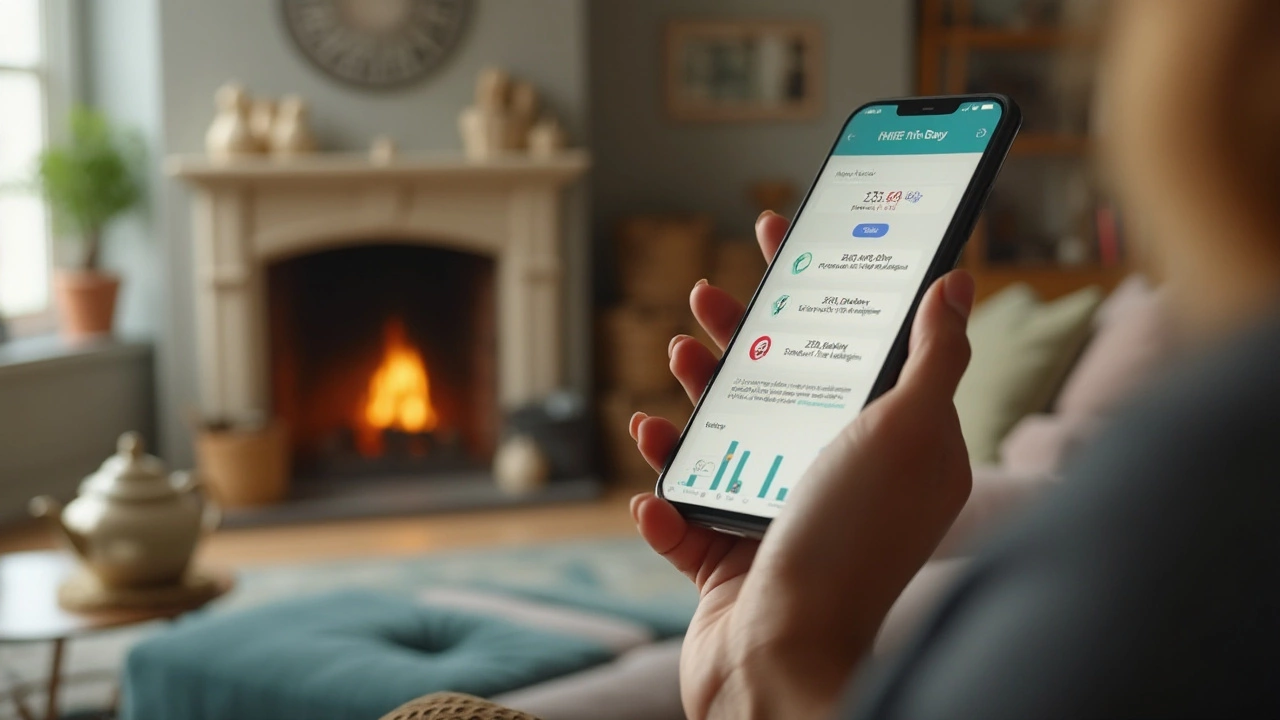Buying a home for the first time is a monumental step filled with excitement and, often, some apprehension. While this journey may seem daunting, there are specialized programs designed to assist new homebuyers in making informed decisions without feeling overwhelmed. These programs, presented by various banks, offer diverse perks such as competitive interest rates, down payment assistance, and flexible credit requirements.
In 2025, banks have taken significant strides in tailoring their offerings to support the unique needs of first-time buyers. However, finding the best fit requires careful evaluation of each program's characteristics and how well they align with your financial situation and homeownership goals. Understanding these programs can help reduce stress and provide a smoother transition into homeownership.
- Understanding First Time Home Buyer Programs
- Top Banks Offering Home Buyer Support
- Key Features to Consider
- Tips for Choosing the Right Program
Understanding First Time Home Buyer Programs
Purchasing a new home is not just about finding the perfect living space; it’s a careful dance with financial institutions and discerning the best options laid out for you as a first time home buyer. These programs are structured to ease the financial burden associated with buying a home for the first time and can provide a substantial leg up in the market. Most banks aim to attract new buyers by offering competitive terms through lower interest rates, reduced down payments, or added flexibility in qualifying criteria.
One critical aspect of these programs is how they are tailored to cater to individual financial circumstances. For instance, some banks might focus on offering mortgage assistance for buyers struggling with hefty down payments, while others might have customized assistance plans that account for varying credit scores. This variability allows potential buyers to choose a program that best fits their circumstances, encouraging a more personalized approach to home buying.
According to data analyzed from various financial institutions, there is a noticeable trend toward increasing inclusivity in home buyer programs, particularly in making housing accessible to lower-income families or those buyers with historically lesser buying power. Banks like Wells Fargo and Bank of America have been noted for their targeted programs designed to aid first-time buyers, often incorporating educational resources that demystify the buying process.
"First-time home buyer programs are crucial, as they open the door to affordable homeownership opportunities, which is a cornerstone of financial stability," says Jane Reeves, a housing analyst at the National Association of Realtors.
Understanding the nuances of these programs also involves knowing the type of assistance offered. Typically, these may include grants, which you don’t have to repay, loans with deferred payments, or simple interest rate reductions to ease the monthly repayment burden. Some programs might even have provisions to consider the area where you plan to buy, encouraging purchases in developing neighborhoods and offering additional perks for selecting these locations.
| Bank Name | Program Feature | Maximum Benefit |
|---|---|---|
| Bank of America | Grants for Down Payment | $7,500 |
| Wells Fargo | Flexible Credit Scores | As low as 580 |
| Chase | Interest Rate Discounts | 0.5% off APR |
The decision-making process for selecting the right home buyer program should ideally start with an assessment of personal finances, credit health, and a well-defined scope of how much financial assistance is required. Researching different banks and their specific offerings can make a significant difference, potentially saving buyers thousands over the lifetime of a mortgage. With the market constantly evolving, staying informed is pivotal for maximizing the benefits these programs can offer.

Top Banks Offering Home Buyer Support
In the dynamic world of real estate, first time home buyers often look for banks that can offer them the best deals and programs tailored to their needs. For 2025, several major banks have stepped up, each providing unique options and incentives to assist new homeowners. For example, Wells Fargo, a household name in the banking industry, continues to provide their home buyer programs with competitive interest rates and reasonable down payments. Their My FirstHome initiative is specifically designed to educate new buyers on the financial responsibilities associated with owning a house.
Another significant player, Bank of America, has made strides with their Affordable Loan Solution mortgage program, which requires as little as 3% down payment, without the burden of private mortgage insurance (PMI). This benefit can make a substantial difference for those stretched thin with their budgets. According to a Bank of America spokesperson, "We want to make the dream of homeownership accessible to more aspiring homeowners." This driving philosophy aims to reduce barriers to entry and provide economic stability to families and communities.
Chase Bank, also a leader in the mortgage industry, offers DreaMaker mortgages, ideal for maximizing mortgage assistance. With reduced down payments and flexible credit guidelines, these products allow prospective buyers with moderate incomes the opportunity to secure a home loan easily. In addition, Chase provides educational resources and guidance throughout the application process, reassuring new buyers who might be unfamiliar with mortgages. A strong understanding of loan terms can prevent future pitfalls.
In an increasingly technological age, online banks such as SoFi and Ally are challenging the traditional giants by offering fast and convenient mortgage approval processes. These platforms often reduce the complexities and layers involved in applications. Their approach caters to younger buyers who value swift, online transactions. SoFi’s home loan perks include no hidden fees and access to helpful customer service, ensuring that virtually the entire experience from browsing to buying is as seamless as possible.
For those looking at regional banks, your options vary by location, but institutions like SunTrust and U.S. Bank might offer competitive local programs. Collaborating with a bank that understands regional housing markets can offer strategic advantages. As buying a home is as much an emotional decision as a financial one, having a partner familiar with local dynamics can prove invaluable in the long-term investment of a house.
Ultimately, choosing the right bank's home buyer programs depends on one's specific needs and financial situation. Whether one is swayed by the promise of low rates, the banishment of PMI, or personalized service, these programs from both large and small banks provide diverse strategies for tackling this significant life milestone. Investigating each thoroughly will ensure that buyers are well-positioned for a fruitful experience in their first home ownership journey.

Key Features to Consider
When embarking on the journey as a first time home buyer, it's vital to examine the fine details of the mortgage programs offered by banks. Each program comes with unique features that can significantly impact your financial health and home-buying experience. One of the first aspects to evaluate is the interest rate. Even a slight difference in the rate can lead to considerable savings or expenses over time. Fixed-rate mortgages provide stability by keeping your monthly payments consistent, whereas adjustable-rate mortgages might offer lower initial rates but come with the risk of increasing over time. By understanding your risk tolerance and financial planning, you can select the right type of rate structure that aligns with your goals.
Another crucial feature to consider is down payment assistance. Many banks offer programs that either reduce the minimum required down payment or provide grants to help cover this significant upfront cost. This can be especially beneficial for first-time home buyers who may not have enough savings for a large down payment. It's worth exploring options that require as little as 3% down or even no down payment at all under specific conditions. However, it's important to read the terms carefully, as these can affect the interest rate or come with additional insurance requirements.
Credit score requisites play a significant role in determining eligibility for mortgage assistance. Generally, higher credit scores can unlock more favorable terms, such as lower interest rates and higher loan amounts. But for those with less than stellar credit, some programs are designed specifically to help individuals qualify for a home loan. According to FICO, a score of at least 620 is often needed, but some first-time buyer programs can accommodate lower scores through alternative credit assessment methods.
"Your credit score is the key to unlocking the best mortgage rates and terms," notes Barbara Corcoran, a well-known real estate mogul. "Understanding this relationship is crucial for all first-time buyers considering their future financial commitments."
Lastly, explore any extra benefits or perks that might come with specific bank programs. These could include waived processing fees, the ability to refinance more easily in the future, or offer complementary financial advisory services or access to exclusive property listings. Always assess these features in light of the program's total cost and potential savings they might yield over the loan's lifespan.

Tips for Choosing the Right Program
Choosing the right home buyer program is akin to selecting the perfect key for a new door; it opens up opportunities and ensures a seamless entry into homeownership. When you're a first-time home buyer, the sheer number of choices can be overwhelming, but with a strategic approach, you can navigate through the clutter. Start by examining your financial health closely. This means assessing your credit score, current debts, and how much you can feasibly allocate toward a monthly mortgage. Many banks have specific requirements tied to their home buyer programs, which might include a minimum credit score or a particular debt-to-income ratio. Ensuring you meet these criteria beforehand can significantly streamline your selection process.
Next, consider what type of assistance you need most from these programs. For some buyers, a low down payment option is crucial, while for others, the priority might be securing the lowest possible interest rate. Evaluating these factors in relation to your long-term goals can guide you toward the program that best fits your needs. Another essential aspect is researching whether the banks provide education classes or counseling services as part of their offerings. Knowledge is not just power in this context but a shield that can safeguard you against potential pitfalls. The Federal Home Loan Mortgage Corporation, often known as Freddie Mac, emphasizes the importance of 'borrower education' in guiding buyers toward options that prevent default and enhance financial literacy.
"An informed buyer is a protected buyer," suggests a recent banking report on mortgage assistance programs, emphasizing how crucial understanding the terms can be for new homebuyers.
Don't shy away from diving into the fine print of these programs. The details often reveal aspects like prepayment penalties or adjustable rates that could affect your financial commitment profoundly. Pay attention to whether the mortgage assistance you’re seeking is on a fixed or adjustable basis and whether it aligns with your projected financial path in coming years. A conversation with a mortgage advisor can be invaluable here; they possess insights into trends and particular nuances of various offers that might not be immediately apparent.
Finally, compare the customer service and reputation of the banks you're considering. A financial institution that is transparent, communicative, and customer-centric can make the home buying process not only smoother but more pleasant. Seeking feedback from past clients and reading reviews can provide a glimpse into how a bank operates and its approach to customer satisfaction. This step can reassure you that the choice you’re making is in partnership with an institution genuinely interested in your successful transition to homeownership.
| Aspect | Criterion |
|---|---|
| Financial Health | Credit Score, Debts |
| Assistance Type | Down Payment, Interest Rate |
| Program Extras | Education, Counseling |
| Loan Details | Fixed or Adjustable |
| Bank Reputation | Customer Service, Transparency |


Corbin Fairweather
I am an expert in real estate focusing on property sales and rentals. I enjoy writing about the latest trends in the real estate market and sharing insights on how to make successful property investments. My passion lies in helping clients find their dream homes and navigating the complexities of real estate transactions. In my free time, I enjoy hiking and capturing the beauty of landscapes through photography.
view all postsWrite a comment